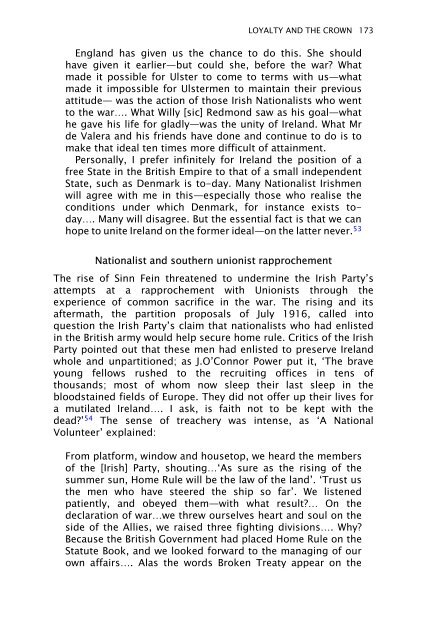Dividing Ireland: World War I and Partition
Dividing Ireland: World War I and Partition
Dividing Ireland: World War I and Partition
Create successful ePaper yourself
Turn your PDF publications into a flip-book with our unique Google optimized e-Paper software.
LOYALTY AND THE CROWN 173<br />
Engl<strong>and</strong> has given us the chance to do this. She should<br />
have given it earlier—but could she, before the war? What<br />
made it possible for Ulster to come to terms with us—what<br />
made it impossible for Ulstermen to maintain their previous<br />
attitude— was the action of those Irish Nationalists who went<br />
to the war…. What Willy [sic] Redmond saw as his goal—what<br />
he gave his life for gladly—was the unity of <strong>Irel<strong>and</strong></strong>. What Mr<br />
de Valera <strong>and</strong> his friends have done <strong>and</strong> continue to do is to<br />
make that ideal ten times more difficult of attainment.<br />
Personally, I prefer infinitely for <strong>Irel<strong>and</strong></strong> the position of a<br />
free State in the British Empire to that of a small independent<br />
State, such as Denmark is to-day. Many Nationalist Irishmen<br />
will agree with me in this—especially those who realise the<br />
conditions under which Denmark, for instance exists today….<br />
Many will disagree. But the essential fact is that we can<br />
hope to unite <strong>Irel<strong>and</strong></strong> on the former ideal—on the latter never. 53<br />
Nationalist <strong>and</strong> southern unionist rapprochement<br />
The rise of Sinn Fein threatened to undermine the Irish Party’s<br />
attempts at a rapprochement with Unionists through the<br />
experience of common sacrifice in the war. The rising <strong>and</strong> its<br />
aftermath, the partition proposals of July 1916, called into<br />
question the Irish Party’s claim that nationalists who had enlisted<br />
in the British army would help secure home rule. Critics of the Irish<br />
Party pointed out that these men had enlisted to preserve <strong>Irel<strong>and</strong></strong><br />
whole <strong>and</strong> unpartitioned; as J.O’Connor Power put it, ‘The brave<br />
young fellows rushed to the recruiting offices in tens of<br />
thous<strong>and</strong>s; most of whom now sleep their last sleep in the<br />
bloodstained fields of Europe. They did not offer up their lives for<br />
a mutilated <strong>Irel<strong>and</strong></strong>…. I ask, is faith not to be kept with the<br />
dead?’ 54 The sense of treachery was intense, as ‘A National<br />
Volunteer’ explained:<br />
From platform, window <strong>and</strong> housetop, we heard the members<br />
of the [Irish] Party, shouting…‘As sure as the rising of the<br />
summer sun, Home Rule will be the law of the l<strong>and</strong>’. ‘Trust us<br />
the men who have steered the ship so far’. We listened<br />
patiently, <strong>and</strong> obeyed them—with what result?… On the<br />
declaration of war…we threw ourselves heart <strong>and</strong> soul on the<br />
side of the Allies, we raised three fighting divisions…. Why?<br />
Because the British Government had placed Home Rule on the<br />
Statute Book, <strong>and</strong> we looked forward to the managing of our<br />
own affairs…. Alas the words Broken Treaty appear on the








